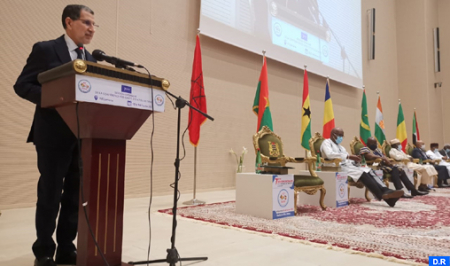The long-term victory against terrorism will be in the field of human development and the fight against this scourge will continue on the political, economic, social, intellectual and human fronts, Head of Government, Saad Dine El Otmani said Monday in N’Djamena.
“We are not and we have never been spectators of what is happening in the Sahel,” El Otmani said at the opening of the 7th Summit of the Heads of State of the Group of Five for the Sahel (G5 Sahel) member countries.
El Otmani, who leads a delegation representing HM King Mohammed VI at the two-day Summit, reiterated Morocco’s solidarity with the countries of the region to confront this terrorist threat.”This is not the first summit in which Morocco is taking part.”
“I feel the privilege and the responsibility of the proximity between my country and yours,” he said, recalling the content of the Sovereign’s speech before the Tunisian Parliament in May 2014, in which HM the King stressed that “those who think a country can deal with security and stability problems on its own are just as wrong. Experience has shown the failure of approaches that exclude others when seeking to address the security threats looming over the region; this is especially true when it comes to the development and security challenges facing the Sahel and Sahara region.”
Recalling that HM the King was keen to respond favorably to the invitation addressed to him by Mohamed Cheikh Ould EL-Ghazouani, President of the Islamic Republic of Mauritania, jointly with Idriss Deby Itno, President of the Republic of Chad and current Chairman of the G5 Sahel, El Otmani congratulated Mauritania on behalf of the Kingdom of Morocco for its successful presidency of the G5-Sahel, at a time of unprecedented harshness marked by the Covid-19 pandemic, and congratulated Chad for its accession to the presidency of the G5 Sahel.
“Like you, we do not allow ourselves to do so. We stand in solidarity with our friends, the countries of the region, to counter this threat that affects us directly,” the head of Government said.
He also expressed Morocco’s keenness to share its experience in the fight against terrorism with its brother countries in the Sahel, through concrete actions.
According to El Otmani, this summit comes seven years after the creation of the G5 Sahel, which has continued to demonstrate its relevance, by making the challenges of each one the challenges of all, building strategic coherence around common operational objectives and achieving important tactical victories which go beyond its own geographical boundaries, through alliances and new international synergies.
“We meet again to reiterate our determination to defeat the enemy who, let’s face it, is not yet subdued,” he added, noting that although 2020 has seen fewer attacks than 2019, it has also seen some of the worst attacks ever recorded.
In some countries, the number of victims has increased fivefold, while more than 3.5 million people are now refugees and internally displaced persons, and the “Islamic state”, which is dying elsewhere, continues to plague the Sahel, where 41% of the attacks between 2019 and 2020 are attributable to it, El Otmani pointed out.
For the Head of Government, the border between terrorism, separatism and transnational organized crime is becoming even thinner, the interconnections are lucrative, and therefore growing, and the loot amounts to hundreds of millions of dollars.
In 2014, His Majesty the King called in His Throne Day Speech for “collective action to deal with terrorist groups, which find allies in separatist movements, human trafficking gangs and arms and drug dealers because of their converging interests,” El Otmani recalled.
Thus, the immediate response against terrorism is first and foremost security. Armed terrorist groups understand only the language of firmness, he added, stressing that the military commitment of the G5 Sahel partners must continue and strengthen.
According to El Otmani, Morocco will continue supporting the creation of the G5 Sahel Defense College in Nouakchott and providing training to officers from sister countries in the Sahel in its military training institutes.
The fight against terrorism is also a fight of ideas. HM the King, Commander of Believers, makes sure that imams from the region are trained within the Mohammed VI Institute for the Training of Mourchidine and Mourchidate Imams, he added. In fact, 937 registrants from ECOWAS countries took part in the training cycles for the year 2018-2019. Several hundred are already practicing in their countries of origin helping to counter religious extremism.
“Moreover, we cannot move towards effective and multidimensional responses in the Sahel without addressing the issue of desertification and climate change. More than 12 million people are in a situation of food insecurity, and the impact on agriculture is estimated at more than 2 billion dollars per year by 2030,” said El Otmani.
In that regard, Morocco will strengthen its commitment in the Climate Commission for the Sahel region, created at the African Summit for Climate Action, held under the effective chairmanship of His Majesty King Mohammed VI in 2016, he announced.
“These multidimensional challenges make us realize the importance not only of ensuring sustainable financing for the G5, but also of increasing it. The pledges made at the G5 Sahel Partners and Donors Coordination Conference held in December 201 in Nouakchott must be kept,” El Otmani concluded.
The two-day summit, which will focus on issues of development at the service of peoples, will take stock of developments in the actions of the G5 Sahel.


